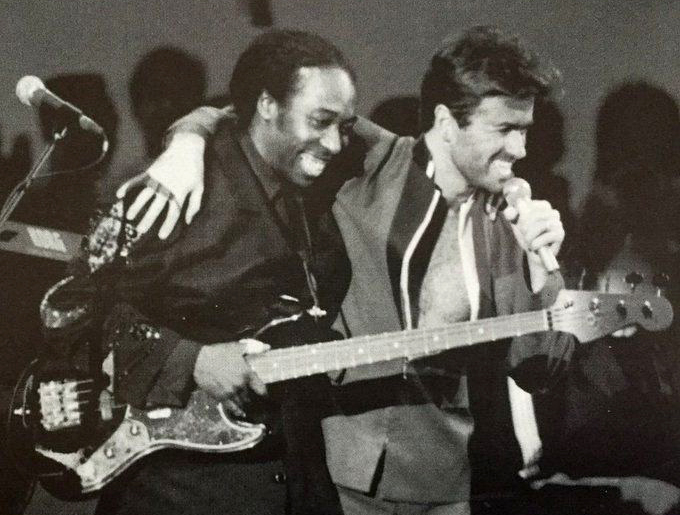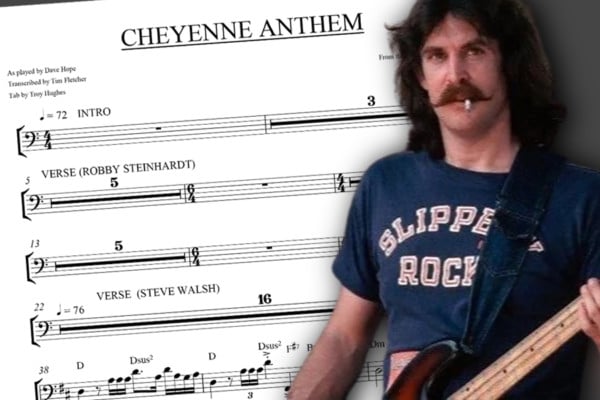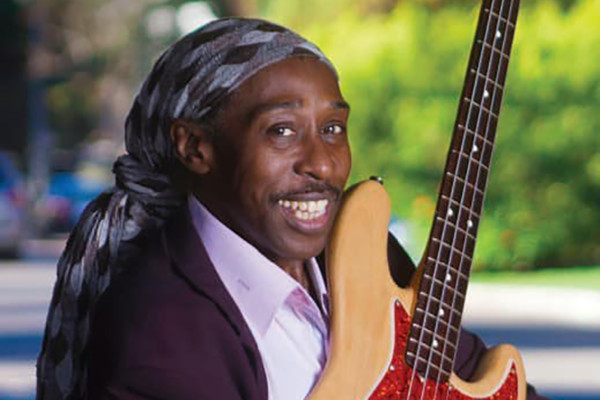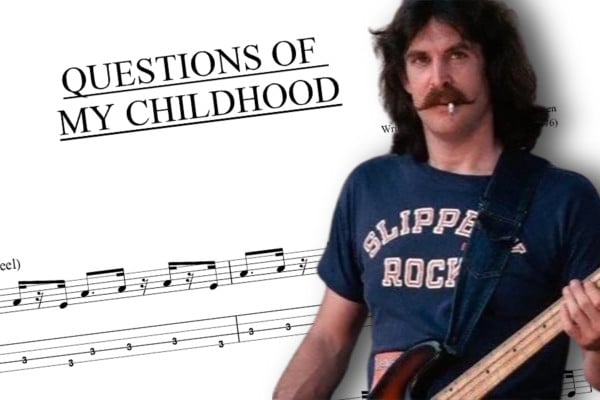Bass Transcription: Deon Estus’ Bass Line on “Club Tropicana” by Wham!

Wham! was a very successful UK pop act, featuring the vocal talents of George Michael. Many of their hits featured bassist Deon Estus, who also played in their live band, including their ground-breaking concerts in China in 1985. Estus also featured on Michael’s post-Wham studio work and continued to work with him throughout his solo career.
Estus was born on July 4th, 1956 and grew up in Detroit. At the age of three his grandmother bought him his first guitar. As a child, he was a talented singer and performed opera with the Philadelphia Philharmonic Orchestra youth program. By the age of ten, he was playing piano, bass, drums, guitar, and saxophone.
He later attended Northwestern High School, Detroit, where he sang second tenor in the school choir. He also studied bass with Motown legend James Jamerson, who had attended the same school. In his teens, he formed a band which supported The Whispers and The Brothers Johnson on tour.
After school, Estus played with Detroit funk/R & B group Brainstorm on their albums Journey to the Light (1978) and Funky Entertainment (1979), before moving to Belgium in 1979 to work with Marvin Gaye as part of his touring band. He was asked to play on Gaye’s album Midnight Love but he declined due to session commitments, not realizing it was to be Gaye’s last album before his death.
In 1982 he moved to Dublin, Ireland to work with Phil Lynott of Thin Lizzy, and while there, Estus was approached by Dick Leahy, George Michael’s publisher who asked him to consider working with Michael on some songs that he had written. They met in London and hit it off, and Estus later recalled of George Michael that he “… knew he would be big”, and that he was “fun and very sure of himself… he was a beautiful person and a great friend”. Estus was quickly taken on as both bass player and musical director for the band that was formed around Michael and Andrew Ridgeley.
The collaboration with Wham! was to produce three platinum studio albums; Fantastic (1983), Make it Big (1984) and The Final (1986), and fourteen UK hit songs, five of which hit number one. In total the band sold fifteen million singles and thirteen million albums. Estus also played in Wham’s touring band, and took part in their extensive 1984-85 world tour which culminated in two historic concerts in Beijing and Canton – they were the first western pop group to play in China.
After Wham! split in 1986, Estus played on George Michael’s first two solo albums Faith (1987) and Listen Without Prejudice Vol 1 (1990), and Andrew Ridgley’s solo album Son of Albert (1990).
Aside from Wham! and George Micheal, Estus has also featured on albums by a varied range of artists including Tina Turner, Annie Lennox, Aretha Franklin, Amii Stewart, Elton John, and Frank Zappa. In 1989 he wrote and produced his own album Spell – the title track reached #11 on the US Adult Contemporary chart and the single “Heaven Help Me” reached #5 on the Billboard chart. Estus released another album Only Love is Real in 2012.
Estus is currently a partner in Vox Tone, a multimedia company where he is a producer and artist developer. Estus is also still busy with sessions and live work and recently played for the Bros reunion concert at London’s O2 Arena.
Estus played Fender and Ibanez basses on the Wham! recordings, and also plays Status Basses.
“Club Tropicana”
“Club Tropicana” was released in 1983, and is a song that both reflects and satires the cheap package holiday boom that was popular among youngsters in the UK at the time, where cheap flights, hotels, and especially alcohol encouraged many to take holidays in Spanish and Greek islands.
The song starts with a fade-in of a busy slapped funk groove, which can be thumbed throughout, and then swaps to a more R & B style fingerstyle idea with some well-judged space. The verse continues this groove, but the choruses use a more straightforward idea, with simpler rhythms and less syncopation.
After a repeat of the verse and chorus, there is a keyboard solo where Estus fattens the verse groove slightly, with longer notes at the end of the riff. After another chorus, there is a short bass solo, with slides, harmonics, and slap techniques included. A re-cap of the intro groove is followed by further verses and choruses, and some variation of slap fills at the end of choruses and verse patterns.
Download the transcription and follow along with the track:



I love seeing Deon Estus here where he totally belongs.
Great work!
Thanks Tomas! Yes, he’s a great player – he made those Wham songs shine, and his work with George Michael was sublime.